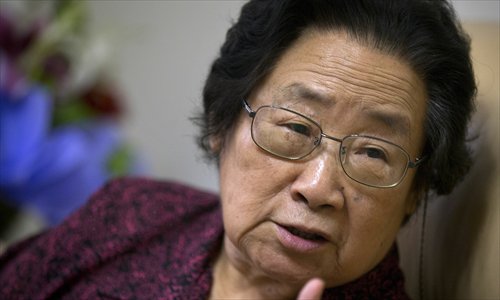Nobel Prize win sparks academic selection debate

Chinese 2015 Nobel Prize winner in medicine Tu Youyou speaks during an interview in her apartment in Beijing on Wednesday. Photo: AP
Tu Youyou, China's first Nobel laureate in medicine, has shocked the public and triggered much reflection over China's research institutions as the scientist was found to have been repeatedly denied the honor of an academician.
Tu, 85, was awarded the Nobel Prize on Monday for her contribution in creating a drug that effectively combats malaria.
She was nicknamed online as the "Three Nos" laureate, for she has no doctorate degree, no experience studying in an overseas university and she was never elected to be an academician.
Rao Yi, a neurobiologist at Peking University who has been advocating for Tu's long-neglected contribution, called Tu's Nobel Prize "a shock to China's scientific system" and said whether to reform the system is a decision "to verify if officials are up for their jobs."
"It is a shame to the system and the [Chinese] culture that Tu had been for so long neglected. The reason behind this is [the system's] hindrance to creativity and development," Rao told the Global Times.
His opinion was echoed by Gao Xuemin, a professor with the Beijing University of Chinese Medicine, who told the Global Times that the problem of corruption should be addressed in the selection of academicians and the selection criteria should be re-evaluated.
Speculations of corruption and cronyism have long haunted the selection procedure of academicians to the Chinese Academy of Sciences and the Chinese Academy of Engineering (CAE), especially after Xie Jianping, a researcher under China Tobacco, a State-owned manufacturer of tobacco products, was elected academician of the CAE in 2011 for his research on how to reduce the health risks caused by smoking.
Interview requests from the Global Times were turned down on Wednesday night by Tu's husband, Li Tingzhao, who said Tu's age and health forbid her from further speaking to reporters.
Inspired by traditional Chinese medicine (TCM), Tu discovered Artemisinin a drug that is now part of standard antimalarial regimens, having been proven to reduce fatalities from the disease.
She said in an earlier statement that Artemisinin is a gift to the world and that the Nobel Prize is an honor to China's scientific field and a symbol that TCM has gained world recognition.